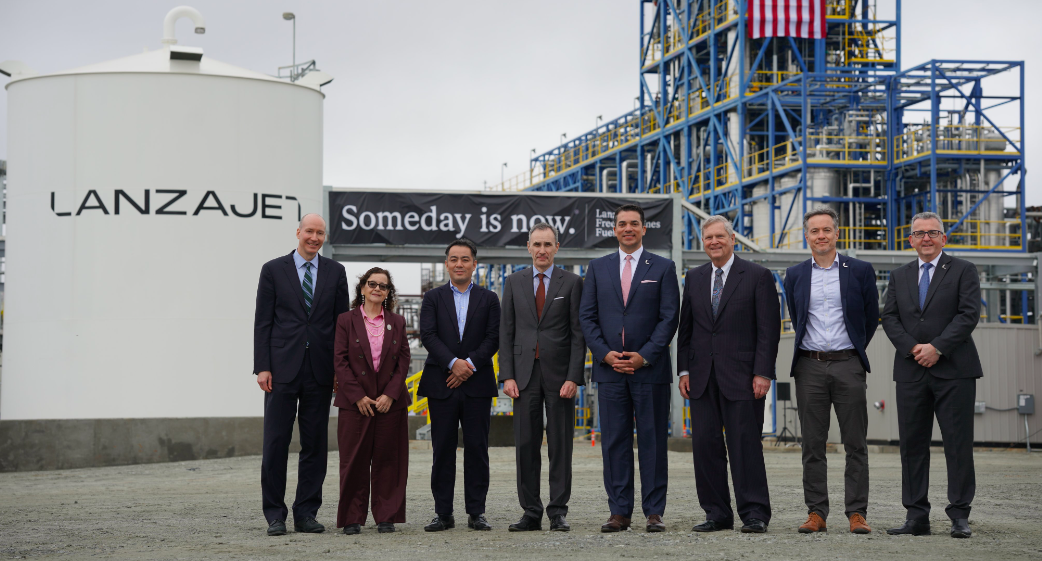Plant uses biofuel made from both traditional raw materials, including American-grown corn, as well as from advanced technologies. Located in Soperton, Georgia, the facility will produce 10 million gallons of SAF and renewable diesel per year
The world’s first plant using ethanol to make lower-polluting jet fuel opened in the US and it has been heralded a landmark moment by politicians and environmentalists in the US.
Illinois-based LanzaJet Inc. formally unveiled its $200 million facility in rural Georgia on Wednesday (January 24) with investors, including Suncor Energy Inc. and IAG SA’s British Airways as well as US Department of Agriculture Secretary Tom Vilsack and local officials.
The plant, which received US government funds, plans to use biofuel made from both traditional raw materials, including American-grown corn, as well as from advanced technologies, LanzaJet CEO Jimmy Samartzis said in an interview. Located in Soperton, Georgia, the facility will produce 10 million gallons of SAF and renewable diesel per year. US President Joe Biden has called for at least 3 billion gallons of overall SAF production annually by 2030.
LanzaJet, a leading sustainable fuels technology company and sustainable fuels producer, today joined government officials, industry leaders, and investors to celebrate the grand opening of LanzaJet Freedom Pines Fuels in Soperton, Georgia.
Freedom Pines Fuels is the world’s first alcohol-to-jet (ATJ) SAF production facility and will begin producing 10 million gallons of SAF and renewable diesel per year from ethanol, using a range of sustainable, low carbon intensity ethanol, including from waste-based feedstocks, to substantially increase the amount of current SAF production in the United States.
“Today is testament to the conviction required by industry, government, and funders to advance innovation and stretch the boundaries of what is achievable to address decarbonization and tackle climate change,” said LanzaJet CEO Jimmy Samartzis.
“This is a historic milestone in a long history of firsts for LanzaJet, the United States, and the SAF industry globally. Our novel LanzaJet ethanol to SAF process technology is now deployed at our commercial plant in Georgia which will convert ethanol into drop-in SAF. As we start-up the plant, we will continue to refine our technology, while launching our efforts to advance new sustainable fuels projects globally.
“Between feedstock versatility, efficiency, and economics that enable scale in the US and globally, we stand ready to meet aviation’s decarbonization goals established at the United Nations and country ambitions, such as the U.S. SAF Grand Challenge.”
Federal government has welcomed the opening. In a statement U.S. Secretary of Agriculture Tom Vilsack said: “The Biden-Harris Administration is committed to harnessing the full potential of SAF as we continue to build a strong economy that is sustainable, resilient, competitive, and keeps rural places thriving.
“As we transition to SAF, this will not only create new climate smart commodity markets for American producers, but it will also help American companies such as LanzaJet corner the market of a valuable, emerging industry, while revitalizing rural communities like Soperton with agriculture front and center in the effort. LanzaJet’s facility will help accelerate the SAF industry and provide new economic opportunities for producers for a more sustainable future.”
The opening prompted Iowa groups to warn that farmers and ethanol makers in the top US corn-producing state are at risk of missing out on the chance to significantly profit from the developing market for sustainable aviation fuel, or SAF.
“No Iowa ethanol plant currently has a carbon intensity score low enough to qualify as an ingredient to make SAF,” according to a statement from the Iowa Renewable Fuels Association and Iowa Corn Promotion Board. By contrast, Brazil, which mainly makes ethanol from sugarcane, produces over 7 billion gallons of ethanol with a carbon score expected to qualify for SAF production, the groups said.
AG invested in LanzaJet in 2021, and has said it plans to bring the technology to the UK. The UK government has set a target of having five sustainable aviation fuel plants in construction by 2025.
Sean Doyle, Chairman and CEO, British Airways said: “SAF will play a critical role in meeting our net zero targets and especially in reducing aviation’s emissions this decade. It is the only viable solution for long-haul flights. Today’s opening is a true milestone in the development and commercial production of SAF using LanzaJet’s ethanol to SAF process technology.
“This project acts as the blueprint for using this innovative technology right here in the UK, starting with Project Speedbird, and shows how quickly the US is moving ahead. We must continue to work with the UK Government to encourage investors to put money into SAF production and meet its own targets of having five commercial-scale SAF plants under construction in the UK by 2025. The Government has already started on this journey, and we welcome this, but what we need now is pace.”
Luis Gallego, CEO, International Airlines Group (IAG) said: “The LanzaJet ethanol-to-jet fuel plant in the US is a demonstration of how government support and investment in green technologies can help make aviation more sustainable. At IAG, we look forward to bringing LanzaJet’s technology to the UK, with Nova Pangaea, to help the UK meet its target of five Sustainable Aviation Fuel plants in construction by 2025.”





